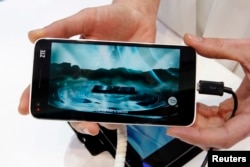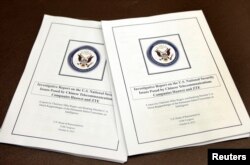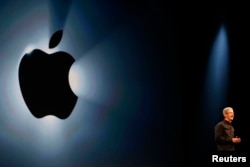Two of China’s leading networking and telecommunications companies are getting ready to storm the global markets for high-tech mobile devices and take on the likes of tech giants Apple and Samsung with their own brand-named products.
ZTE Corp., hopes to win over U.S. customers with a line of new phone/tablet combination devices and Huawei is targeting Asia and Western Europe with a super-slim smartphone.
Industry experts caution that challenging heavyweights like Apple and Samsung won’t be easy.
But Richard Yu, chairman of Huawei, is confident – some would say overly confident – that his company can pull it off.
“In its latest update, Apple makes the phone extremely simple to use,” Yu told The Telegraph newspaper recently. “But if we are just learning from them we can’t catch up… We want to go higher than them.”
China's domestinc advantage
Kitty Fok, a marketing manager with the global market research firm, IDC, says the Chinese companies like Huawei and others will be getting some help in challenging the industry leaders.
Fok says the Beijing government's long-time focus on the high-tech sector and its insistence on developing information technology (IT) plays to the advantage of Chinese companies, whether private or state-affiliated.
Accordingly, Beijing has put in place “a whole range of policies that are attempts to improve the competitive position of Chinese firms,” said Adam Segal, a China scholar at the Council on Foreign Relations in New York.
The Chinese “have a clear interest in moving from 'made in China' to 'innovated in China,'” Segal said, and they “have made it clear that they do not want to be dependent on the West.”
Given the dominance of brands like Apple, Samsung and Google’s Android mobile operating system, Beijing is increasingly concerned about the penetration of foreign technology in Chinese society and prefers to have domestic companies playing these roles.
“This is one of the reasons the Chinese booted out Google and why the Chinese have, in a sense, compelled the substitution of domestic providers … for things like Facebook and Google and Twitter,” said Dean Cheng, a China research fellow at the Heritage Foundation’ in Washington.
This also gives the Chinese government “a far greater ability to shut down social media because it owns [more of] these components than almost any other country in the world,” adds Segal.
This month, China’s Ministry of Industry and Information technology issued a white paper that said Google’s Android operating system software had too much control in China’s smartphone industry and accused the company of discriminating against some local firms by delaying the sharing of software codes.
Hacking and the blame game
Chinese media had also criticized Apple and Microsoft product warranty policies and trademark issues in recent months, largely seen as a reaction to last year’s report by the U.S. House Intelligence Committee that said potential government influence over Huawei and ZTE posed a threat to U.S. security. Congress subsequently restricted the purchase of certain high-tech systems and components made in China.
A Chinese Foreign Ministry Spokesman, quoted by Reuters, took issue with the U.S. Congress, saying it “uses Internet security as an excuse to take discriminatory steps against Chinese companies.”
But the Heritage Foundation's Cheng said the Chinese criticism might be an attempt to “leverage more technology out of foreign investors” by portraying them as treating China unfairly.
“They are trying to get the moral upper hand in the course of negotiations,” he said.
But Segal of the Council on Foreign Relations says Beijing realizes it has to move cautiously.
“They still want U.S. and other companies to do research and development in China,” Segal said.
And Cheng notes that this would help Chinese go “after a high technology in order to be competitive” and “move up the value chain in terms of what China produces, and also to position China better as a global competitor.”
“That … translates to the Chinese government wanting Chinese state-owned enterprises to be competitive and facilitating their access, sometimes illegally, to foreign high technology,” Cheng said.
China has been accused of being the source of cyber-attacks against U.S. government agencies and private corporations, often seeking military technology or the latest high-tech industry developments. The computer security firm, Mandiant, has concluded that many of the cyber-attacks have been coming from a secret Chinese military unit in Shanghai.
Beijing has repeatedly proclaimed its innocence and says it is a victim, not the perpetrator, of cyber-attacks. The latest revelations about the U.S. National Security Agency’s internet snooping have played right into the Chinese narrative.
It's all about branding
Whatever the truth, the hacking allegations make it more difficult for Chinese companies to compete on the global level, even for a company like Huawei, which is listed as a private firm.
Even though Chinese web service companies like Baidu and Weibo have been successful at home, Segal says it's not at all assured their domestic success, even in a market as large as China, will provide a base for successful global operations.
As for companies like Huawei and ZTE going global with their own brand-named phones and tablets, Cheng said they would be facing “some serious issues – everything from corporate reputation to issues of quality control.”
Huawei, according to Reuters, was the fourth-largest smartphone maker in the first quarter of 2013, trailing LG Electronics, Apple and Samsung, and selling nine million phones - mostly in China.
ZTE Corp., hopes to win over U.S. customers with a line of new phone/tablet combination devices and Huawei is targeting Asia and Western Europe with a super-slim smartphone.
Industry experts caution that challenging heavyweights like Apple and Samsung won’t be easy.
But Richard Yu, chairman of Huawei, is confident – some would say overly confident – that his company can pull it off.
“In its latest update, Apple makes the phone extremely simple to use,” Yu told The Telegraph newspaper recently. “But if we are just learning from them we can’t catch up… We want to go higher than them.”
China's domestinc advantage
Kitty Fok, a marketing manager with the global market research firm, IDC, says the Chinese companies like Huawei and others will be getting some help in challenging the industry leaders.
Fok says the Beijing government's long-time focus on the high-tech sector and its insistence on developing information technology (IT) plays to the advantage of Chinese companies, whether private or state-affiliated.
Accordingly, Beijing has put in place “a whole range of policies that are attempts to improve the competitive position of Chinese firms,” said Adam Segal, a China scholar at the Council on Foreign Relations in New York.
The Chinese “have a clear interest in moving from 'made in China' to 'innovated in China,'” Segal said, and they “have made it clear that they do not want to be dependent on the West.”
Given the dominance of brands like Apple, Samsung and Google’s Android mobile operating system, Beijing is increasingly concerned about the penetration of foreign technology in Chinese society and prefers to have domestic companies playing these roles.
“This is one of the reasons the Chinese booted out Google and why the Chinese have, in a sense, compelled the substitution of domestic providers … for things like Facebook and Google and Twitter,” said Dean Cheng, a China research fellow at the Heritage Foundation’ in Washington.
This also gives the Chinese government “a far greater ability to shut down social media because it owns [more of] these components than almost any other country in the world,” adds Segal.
This month, China’s Ministry of Industry and Information technology issued a white paper that said Google’s Android operating system software had too much control in China’s smartphone industry and accused the company of discriminating against some local firms by delaying the sharing of software codes.
Hacking and the blame game
Chinese media had also criticized Apple and Microsoft product warranty policies and trademark issues in recent months, largely seen as a reaction to last year’s report by the U.S. House Intelligence Committee that said potential government influence over Huawei and ZTE posed a threat to U.S. security. Congress subsequently restricted the purchase of certain high-tech systems and components made in China.
A Chinese Foreign Ministry Spokesman, quoted by Reuters, took issue with the U.S. Congress, saying it “uses Internet security as an excuse to take discriminatory steps against Chinese companies.”
But the Heritage Foundation's Cheng said the Chinese criticism might be an attempt to “leverage more technology out of foreign investors” by portraying them as treating China unfairly.
“They are trying to get the moral upper hand in the course of negotiations,” he said.
But Segal of the Council on Foreign Relations says Beijing realizes it has to move cautiously.
“They still want U.S. and other companies to do research and development in China,” Segal said.
And Cheng notes that this would help Chinese go “after a high technology in order to be competitive” and “move up the value chain in terms of what China produces, and also to position China better as a global competitor.”
“That … translates to the Chinese government wanting Chinese state-owned enterprises to be competitive and facilitating their access, sometimes illegally, to foreign high technology,” Cheng said.
China has been accused of being the source of cyber-attacks against U.S. government agencies and private corporations, often seeking military technology or the latest high-tech industry developments. The computer security firm, Mandiant, has concluded that many of the cyber-attacks have been coming from a secret Chinese military unit in Shanghai.
Beijing has repeatedly proclaimed its innocence and says it is a victim, not the perpetrator, of cyber-attacks. The latest revelations about the U.S. National Security Agency’s internet snooping have played right into the Chinese narrative.
It's all about branding
Whatever the truth, the hacking allegations make it more difficult for Chinese companies to compete on the global level, even for a company like Huawei, which is listed as a private firm.
Even though Chinese web service companies like Baidu and Weibo have been successful at home, Segal says it's not at all assured their domestic success, even in a market as large as China, will provide a base for successful global operations.
As for companies like Huawei and ZTE going global with their own brand-named phones and tablets, Cheng said they would be facing “some serious issues – everything from corporate reputation to issues of quality control.”
Huawei, according to Reuters, was the fourth-largest smartphone maker in the first quarter of 2013, trailing LG Electronics, Apple and Samsung, and selling nine million phones - mostly in China.








